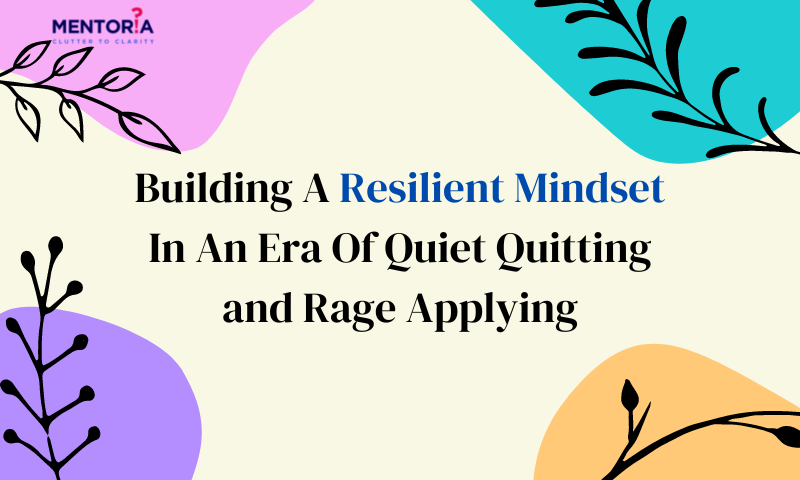Building A Resilient Mindset: Navigating An Era Of Quiet Quitting and Rage Applying

It’s 2023, and the netizens won’t stop their woes about work. Everyone’s pushing through Mondays and eagerly looking forward to the weekend just so that their non-working folks can talk about anything but work. And oh boy, the frustration sure has gone up a big notch.
There’s a commotion in almost every country, and every second organisation you’d know of is facing the phenomenon of quiet quitting. Human resource and talent acquisition professionals are probably in a whirlpool of distress, trying to maintain the corporate-employee balance. With things not happening the way they’re supposed to and critical operations going for a toss, the pandemic, economic recession, and social unrest have made quite an impact on our lives, don’t you think?
It’s no surprise that burnouts, stress, and overwhelming situations at work have taken a toll on a bunch of folks out there. According to Forbes, 95% of HR professionals agree that burnout is a major concern for employee retention. To top the dilemma, 72% of working professionals are quietly quitting; that’s 1 in 4 employees!
In the era of quiet quitting and rage applying, many struggle to keep up with the demands of work, personal life, and everything in between. The current economic recession has added yet another obese layer of distress, leaving many individuals feeling unsure of their future and questioning their resilience.
At this point in time, people are reconsidering their priorities and are struggling to make a change in their lives. And one such change is a phenomenon called quiet quitting. Quiet quitting is doing the bare minimum at work – just enough to ensure you don’t get fired but not enough to justify your paycheck or deserve promotions. This happens when employees disengage from their jobs and responsibilities without formally quitting.
The trend has been on the rise in recent years, but it’s become even more prevalent in the current economic state across the globe. They may stop putting in the effort, miss deadlines, or avoid communicating with their team. Well, this needn’t necessarily mean everyone’s following the trend, because some simply fall into this behaviour due to their incompetence (we all have that one colleague who falls in this category). But jokes apart, this can be due to a variety of reasons. The most challenging part (or problem) with quiet quitting is that it can be hard to detect, and it can lead to decreased productivity and morale for the entire team by the time it’s all figured out.
On the other end of the spectrum, that’s quite an alarming factor for major organisations is rage applying. This is when people apply for jobs out of frustration with their current situation, without even considering whether the new job is a good fit for them. It’s like hitting the “apply” button on the screen without taking a fraction of a second to think about the actuality of the situation. What adds to this chaos is that the recession has made finding a job even more challenging, leading some people to apply for any job they find. While it’s understandable to feel desperate in these times, rage-applying can lead to taking a job that you’ll despise, which will only aggravate the problem.
While both trends can be concerning for an organisation, it is times like these that highlight the importance of resilience in the workplace. As hard as the current situation gets by the day, you simply cannot ponder over the worst because you will tend to lose sight of possible opportunities along the way. So fret not—if you’ve bumped into this blog (even for no reason at all), we’ve shed some light on building resilience in the era of quiet quitting and rage applying, something we think will give some clarity and hope that this situation we’re in isn’t sticking around for long.
How To Switch From Complaining To Problem-Solving
The first step in building resilience is to acknowledge and accept whatever challenges come your way. Take a breather and absorb the momentum of the situation – the pandemic’s impact, social unrest and dilemma, and the mental and emotional health of yourself and those around you. It’s easy to fall into the trap of complaining when things aren’t going well. But this mindset will only drown you in a loop of complaints. The first thing is to identify the root cause of the problem or challenge you’re facing and devise an approach to address it.
One way is to ask yourself the right questions. For example, instead of asking, “Why is this happening to me?” try asking, “What can I do to change this situation?” By reframing your questions, you can shift your mindset from a victim mentality to a problem-solving mindset. Another helpful approach is to simply take action. Take control of the situation and proactively address it before someone else can solve your problems. This could involve seeking advice from colleagues, doing research, or taking a training course.
How To Tackle Emotions When You Feel Overwhelmed
Emotions can be a powerful force that can help or hinder your ability to cope with challenging situations. When you feel overwhelmed, you’ll need to acknowledge your emotions and understand why you think a certain way.
One of the best practices you can make a habit of is mindfulness. It means focusing on the present moment and accepting your thoughts and emotions without judgement. Being mindful allows you to regulate your emotions and reduce stress, especially at work. Another practical and effective way is to engage in self-care activities. This could involve taking a break, exercising, or spending time with loved ones. Taking care of yourself can improve your mental and physical well-being, which can help you cope with stress and overwhelm.
How To Deal With Conflicts At Work
We know this one’s easier said than done. It’s easy to get caught up in all the negativity around and uncertainty of the current situation, but you need to understand that all storms take a while to settle down. Conflicts are pretty common in the workplace and can be a major source of stress and frustration. But if you look at conflicts as an opportunity for growth and learning, you won’t dread them so much the next time you have one.
Start off with an open mind. Try to understand your peer’s perspective and be willing to compromise. And while you communicate, make sure you’re actively listening and expressing yourself clearly. If you’re unable to resolve a conflict on your own, there’s no harm in seeking the help of a mediator. Mediators are trained and renowned for helping parties find common ground and reach a mutually beneficial solution (and that’s how most of your problems could be solved!).
How To Self-Motivate When The Surroundings Don’t
Sometimes, it sure can be a challenging task to stay motivated when the people around you aren’t. That’s where self-motivation is quite the winner in such situations. Set goals for the day, say no to a task you know can’t fit into your day’s schedule, take necessary breaks (or some me-time for yourself), and remind yourself to remain calm and composed when there’s friction at the workplace. Identify the things you need to achieve and break your plans or tasks into chunks of work so you can head towards your goal. By breaking your goals down into smaller, achievable tasks, it’s easier to track your progress along the way. Another way to go about self-motivation is to find inspiration. Surround yourself with people who motivate and inspire you. Seek out positive role models and learn from their experiences. There’s so much you can learn from a single experience (imagine more, the merrier!).
And while life is mundane without failure, it’s super important to embrace it. Instead of seeing failure as a flaw or something that has tested your abilities, try viewing it as an opportunity to learn and grow. Take those risks, try new things, and be willing to make mistakes. You’re already halfway there to building that resilience you’ve been trying to develop.
When times get tough, losing sight of what’s important is quite the common scenario. Building resilience sure takes up your time and effort, but it is so worth it. Take your time to feel better, but in the meantime, build up those skills from your checklist so you can weather any storm with consistent effort. And by taking care of yourself, setting boundaries, finding meaning in your work, developing your skills, staying connected, and staying positive, you can build that long-due resilience now.
Build A Resilient Mindset With Us
We’re glad you’ve come across this blog in the hope of finding comfort and insight into building resilience in this modern era of uncertainty. If you’d still like to gain some clarity, get in touch with our experts from Mentoria. Trust our abilities, and let us take away some of that weight from your shoulders. Our counsellors are known to be one of the best in the country because we know what it’s like to live with vague visions and a lack of clarity (and you’re not alone on this). Wait no longer, we’re hoping to get in touch with you!











